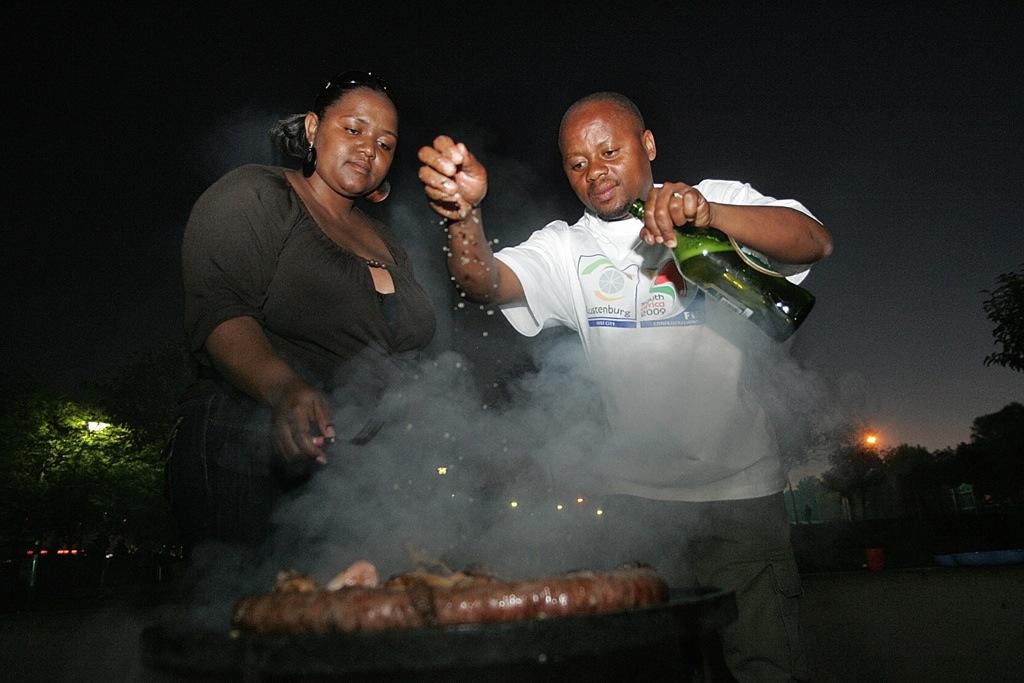If BBQ is an American tradition, for South Africa it is a national obsession
South Africans around a barbecue, called braai in Afrikaans, in Soweto.
JOHANNESBURG, South Africa — While barbequing is an all-American tradition, in South Africa, it has become a fervent national obsession and the inspiration for an unofficial holiday, championed by everyone from suburban dads to Archbishop Desmond Tutu.
Except they don’t call it BBQ here: it’s a “braai,” thank you very much, an Afrikaans word that is both noun and verb, and an essential part of South African social life.
To get to know South Africa, attend a braai — a marathon social occasion lasting all day and into the night, where friends and family gather to eat grilled meat such as “boerewors,” the South African farmers’ sausage, usually while getting drunk.
But oddly enough, you’ll probably find the meat cooking on an American-made device: the Weber grill, produced by a company based in Chicago.
The American-made Weber, mispronounced by locals as “Veeber,” has managed to carve out a place of pride in South Africa’s braai culture, so much so that many South Africans think the Weber braai is manufactured in their country.
More from GlobalPost: Forget cocaine, rhino horn is the new drug of "status"
Niell Grobler, who represents the company’s products in South Africa, said
the Weber braai is seen as a luxury product and status symbol. It is also growing in popularity among the country’s emerging black middle class.
“[Braaing] is part of our life in this country,” Grobler said.
Mike Kempster, executive vice-president of marketing for Weber-Stephen Products LLC, said that compared to the American BBQ, South Africans take it at a slower pace.
In other words, don’t even think of using a gas grill unless you want to be mocked by South African friends, who insist that men do the braaing, and it must involve fire.
“South Africans take a great deal of pride in being able to tend the fire and get it just right,” Kempster said.
A new reality show on South African TV called “The Ultimate Braai Master” showcases these talents, and features one of the country’s top celebrity cooks.
As for the special national pronunciation of the Weber brand name, Kempster said he “couldn’t be happier” that South Africans have made it their own.
“Whenever people pronounce the name the way they want to pronounce it, that’s music to my ears,” he said.
Braaing is so popular that it has its own special day in South Africa, and even an anthem sung by top local musicians.
National Braai Day is held on Sept. 24, known officially as Heritage Day in South Africa, an annual public holiday that was created after the end of apartheid to celebrate the country’s diverse cultures and peoples.
More from GlobalPost: South Africa's perfect storm
Jan Scannell, a South African man who goes by the moniker “Jan Braai,” is the force behind Braai Day and has been on a mission to get it internationally known in the way St. Patrick’s Day is for the Irish.
“That’s the aim. I know it’s a long shot, but this is a long-term project,” said Scannell, who launched the campaign seven years ago and has since tried to introduce braaing around the world.
“We see Braai Day as you see Thanksgiving Day,” Scannell said, adding that “the whole of the population unites around fires,” the way Americans get together around a turkey dinner.
Scannell has faced criticism from some South Africans who argue that Braai Day has taken away from the meaning of Heritage Day, which they say should be focused on the country’s shared history and national identify.
But Scannell sees the braai as a unifier. The word “braai” is recognized in all of the country’s 11 official languages, he said, and the tradition of sitting around a fire is a commonality among every culture.
“It’s an ancient place of gathering in Africa,” Scannell said. “It’s really the one activity that transcends religious and racial boundaries.”
Braai Day’s official patron, the outspoken Nobel peace laureate Desmond Tutu, explained it this way in a video for staff at The New York Times who are marking the holiday in their cafeteria this year.
“A braai… is a uniquely South African social gathering around food that it roasted on an open fire,” he said. “Americans sometimes display similar behavior, calling it a ‘barbeque,’ but it’s not quite the same thing.”
Tutu ended with a belly laugh: “The braai, like rugby and sunny skies, is in our DNA. Ha ha!”
The true believers in the braai are trying to go beyond even the Weber. They want to return all the way to wood fires, like the cave men.
Scannell doesn’t think the charcoal “kettle” braai, the drum shape that is synonymous with the Weber brand in South Africa, is actually a braai.
“I don’t consider it braaing because you’ve not gathered around a fire,” he said. “I like to call it a man oven.”
